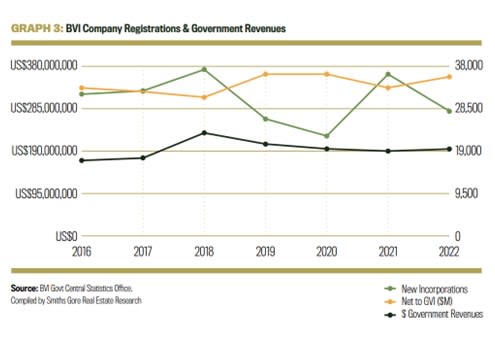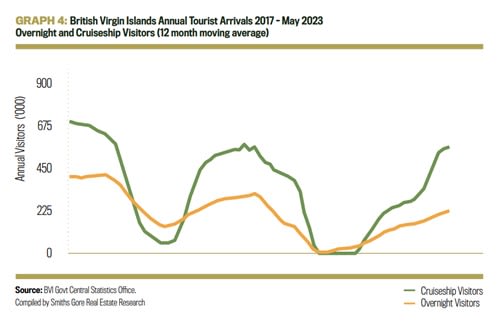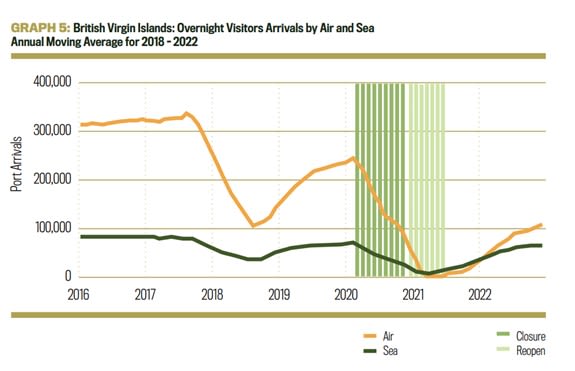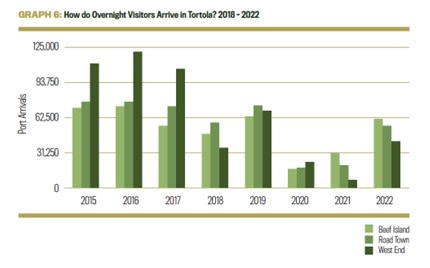It has been at best a year of very mixed fortunes for the BVI, with the legacy of the 2021 Commission of Inquiry (COI) still headlining the news as recently as mid January 2024 as politicians aim to meet strict implementation deadlines. The April General Election certainly shifted focus as the most hotly contested election since 1999, when the current “at large” election system was first implemented and the NDP entered the political equation.
.
The arrival of the American Eagle flight on 1 June, heralded the first direct flights to the American mainland since the short-lived BAe 146 flights in the 1980’s. As we move deeper into 2024 the new administration it is facing a serious challenge to address the many infrastructure issues that need to be fixed. BVI Election 2023 The 2023 general election, the first in the wake of the Commission of Inquiry and the arrest the year before of former Premier Fahie, was set up to be a tightly fought contest. With the VI Party fielding a full-strength team, the NDP and PVIM parties elected to run as separate parties, thus splitting the opposition vote. With a turnout of 57.5%, the at-large vote was won by the opposition with three seats (68% of the at-large vote) to one VIP seat (32% of the at-large vote). However, the VIP performed well in the districts, winning five of the nine seats. With a total of six seats, the VIP were unable to form a Government leaving the opposition parties, with seven seats, to agree on a coalition government. While discussions were on-going, elected at-large NDP representative Lorna Smith agreed to join with the VIP to form the Government, becoming Deputy Premier in the process. Post-election, the Government has created a new Ministry of Financial Services, Labour and Trade (Minister Hon. Lorna Smith) and a Ministry of Environment, Natural Resources and Climate Change which is one of three ministries under Premier Wheatley.
.
As it approaches its first anniversary, the new administration has a number of challenges on its hands. Not least is tackling the myriad serious outstanding infrastructure challenges facing the territory. The Governor has confirmed that the original post Hurricane Irma offer by the UK for a loan guarantee to assist the BVI with rebuilding is no longer available, although a new loan offer could be available if the BVI government was able to meet certain requirements stating: “The UK government is happy to have discussions in this area should further borrowing be required. In particular, if there can be flexibility under the financial management protocols that can be agreed with detailed proposals made to the UK government, that can help to reduce the cost of borrowing for the BVI government.” The Premier has acknowledged the need to borrow to address the failing infrastructure and has previously suggested a resilience fund to attract foreign investors to make donations to the rebuilding of the BVI in return for tax breaks in their home countries.
.
While it remains to be seen how the upgrading of the infrastructure will be funded, the state of infrastructure is viewed by local businesses as a major disincentive to private sector investment. COI Legacy & UK Relations The Commission of Inquiry in 2021 provided a detailed look at how the BVI Government operates, with the report identifying fifty recommendations for the Government to address. While the UK Government decided against imposing direct rule on the BVI, the passing of an Order in Council (Privy Council), which would allow the UK to swiftly suspend the constitution and transfer powers to the Governor, has remained a point of contention with the Premier and BVI politicians. Following comments by the Governor on the possible need to explore “options for additional resources, powers and technical expertise to accelerate reforms”, the Premier reported the Governor to the United Nations Special Committee on Decolonisation stating : “I did place on the record my administration’s objection to the UK continuing to maintain an Order in Council in reserve, that can immediately suspend the constitution. It is not necessary. UK parliamentarians, CARICOM, OECS and the C-24 agree with our position. I also expressed our deep concern about recent statements by the Governor, regarding him potentially obtaining additional powers over the Virgin Islands. This also is not necessary.” The causes for concerns by the Governor, have been laid out in each of the first four (to date) quarterly reports on the progress towards implementing the recommendations of the COI Report and in particular the slow pace of implementation in many areas.
.
The COI recommended that reviews be carried out into certain areas, with four of these reviews eventually being made public following pressure from the Governor prior to the election. He was also instrumental in the release of the Report on the Examination of the House of Assembly’s pandemic Assistance Grants, which was prepared by the Auditor General. While this report is still being absorbed by the public and reported on in the press, a number of politicians were quick to be critical of the findings. In his preface to the third quarterly report, the Governor wrote : “I recognise that some of the initial deadlines in the Framework Agreement proved unrealistic and have had to be revised, but the deadlines need to remain ambitious and we cannot leave delivery to the last minute."
.
Lord Goldsmith set out in his letter that reforms must have “taken root” no later than May 2024.” With Governor John Rankin set to retire from the UK diplomatic service with the new Governor, Mr Daniel Pruce, set to replace him in later this month January 2024 as we go to press. In his final quarterly report, the Governor has stated that he will request additional temporary constitutional power to ensure the implementation of the outstanding COI recommendations. This announcement has set off a fierce condemnation of this request by the Government with the full support of the Opposition. With the BVI facing a number of important milestones, including the on-going constitutional review and an end date to the implementation of the main COI reforms, the on-going relationship between the UK and the BVI remains very much in focus.
.
.
BVI Economy
.
While the general election was in full swing, the debate between those standing for election focused on the issues that mattered to the people of the BVI; infrastructure, education, cost of living crisis, health and the NHI, the post Irma/pandemic recovery to name but a few, there was also debate on the future of the BVI; independence and the relationship with the UK, the constitutional review, airlift and the expansion of the airport at Beef Island and how the economy will fare in a changing world. Now that the dust has settled, the new administration will need to focus on the many issues facing the Territory and develop a road map to demonstrate how these issues will be addressed.
.
The National Sustainable Development Plan (Vision 2036 : Building a Sustainable Virgin Islands) was published in March 2023 with the assistance from the United Nations Economic Commission for Latin America and the Caribbean (ECLAC). The roadmap is to develop a plan for the Virgin Islands for the next fifteen years. The Preface to the report states: “The result has been a people centred achieved integrated roadmap based on a unique vision for the country. Some of the important issues discussed include providing opportunity for the youth; preserving the environment while developing the blue economy; managing diversity while maintaining customs and traditions; sustainable infrastructure given the ravages of recent hurricanes; restarting the economy given the climate risks and COVID 19; and the preparation and movement towards more autonomy and the implications of such governance advancements.” At the launch of the Plan, the Premier stated: “I am highly confident that together we will realise our shared vision of transforming these islands into the economically, socially and environmentally balanced home that we desire and future generations deserve.” The press release noted that the National Sustainable Development Plan (NSDP) emphasises Good Governance; Economy; Infrastructure; Environment; Health and Wellness; and Education and learning, and it is directly aligned with the Sustainable Development Goals adopted in 2015 by the UN, whose agencies will be supporting these efforts.
.
The implementation of the Plan will be facilitated by the Sustainable Development Goals National Coordinating Committee, (SDGNCC) that will be led by the Permanent Secretary in the Premier’s Office. The Blue Economy for the BVI has been the focus of a UNDP (United Nations Development Programme) report entitled “Virgin Islands Strategic Blue Economy Roadmap 2020-2025” which “sets out an integrated approach to ocean based sustainable development, which brings together economy, environment and society, consistent with the Sustainable Development Agenda (2030), Aichi Target 11 of the Convention on Biological Diversity and the Paris Agreement on Climate Change (2015).”
.
The report identifies six focus areas for the marine estate being enabling conditions; marine tourism; fisheries; aquaculture; marine information and science needs and new and emerging opportunities. The Blue Economy is interpreted as maximising “the economic value of the marine environment in a sustainable manner, that preserves and protects the sea’s resources and ecosystems.” The BVI, in particular, has an economy that is reliant on industries that interact with the sea, from local fishermen to the charter industry, which is the backbone of overnight tourism in the destination. The report identifies that the BVI lacks a comprehensive strategy and framework at the national level. It aims to provide a framework for the Government to develop strategies and goals and provide effective co-ordination among the various Government agencies that are responsible for maritime and ocean affairs. While the Government has put in place frameworks for the National Sustainable Development Plan and the Blue Economy, focus remains on the financial services sector and tourism, both of which are considered to be the twin pillars of the economy. Ever since the mid 1980’s, when the financial services sector expanded in the BVI, the industry has been the backbone of economy, regularly contributing around 60% towards total government revenues. However, the industry has faced external pressures particularly after the financial crisis in 2008, when developed economies endured a period of austerity with the focus on multi-nationals using no tax, or low tax ,financial centres to avoid paying higher corporate tax rates.
.
This was compounded by a series of damaging data leaks (the Panama Papers 2016; Paradise Papers 2017 and Pandora Papers 2021) resulting in a move to improve transparency in financial centres. Threats to Government revenues, generated by financial services were identified in the IMF’s 2010 report “British Virgin Islands: Financial Sector Assessment Program Update— Financial System Stability Assessment.” One of the key findings of this report stated : “The heavy reliance on the financial services industry for revenue in the territory creates significant pressure on the FSC to continuously update and adopt regulatory practices that are credible internationally, as well as practical in the jurisdiction.” The report also noted that the BVI’s fiscal health was deteriorating and the economy had been in a deficit position for several years. The report stated that “generating revenue growth is the challenge of the future—it is clear that financial sector growth has slowed as the corporate registration business may have matured. Further growth in this sector must come from value-added services.” The report also noted that “the chief threat to the thriving offshore business is the loss of reputation internationally and the authorities are well attuned to this risk.” After the report was released, the financial services sector experienced a sustained decline in the total number of companies incorporated in the BVI falling by approximately 22% between the end of 2011 and 2023. However, a fee increase in 2018 helped cushion the fall in Government revenues from financial services which increased to $232M in 2018, a 32% increase compared to 2017 and have remained above, or close to, $200M in the years since.
.
.
Graph 3 shows the relationship between new company incorporations in the BVI, the net direct revenue to Government from financial services and total Government revenues between 2016 and 2022. The data indicates that while the number of new incorporations has fluctuated, and total incorporations is gradually falling year on year, direct revenues generated by the financial services sector to the Government has remained steady, following the increase in fees in 2018.
.
As the second pillar of the economy, tourism is important more for the employment it provides (approximately 25% of the workforce) and contribution of approximately one third of the BVI’s GDP than it is to Government direct revenues (3% in 2019; source BVI Macro Fiscal Unit). The yachting sector contributed an estimated 52% of visitor expenditure in 2015 and provides many benefits to the BVI through the distribution of tourism throughout the islands. This sector of the industry was also the first to start operating again in the aftermath of Hurricane Irma in 2017, while land based tourism infrastructure took considerably longer to rebuild. In early May 2023, the BVI Yachting, Hotel and Tourism Association was launched and in July organised three days of stakeholder meetings, inviting speakers to present and members of the public to attend. These stakeholder meetings were welcomed by the community and were an opportunity to give voice to the concerns that have impacted the tourism sector. As noted in the National Sustainable Development Plan “foreign direct investment in the VI has been sporadic and this is particularly evident in the tourism sector. Apart from recovery efforts new resort development has been slow, especially when compared to other competitors in the region. Any new trade and investment policies must balance the need for critical investment in the sector with preserving the uniqueness of the VI’s tourism product.” The report continues : “The lack of Foreign Direct Investment (FDI) has limited the growth potential of the tourism industry. Room inventory for example is much lower than other competing jurisdictions, thereby limiting the ability to host major events such as conferences and sporting activities. Deteriorating public infrastructure including ports, roads, water transportation and water & sewerage has made it difficult to support the tourism industry to the standard that is expected from a luxury destination. Absence of a comprehensive long term tourism strategy to guide the development of the industry for the next 10 – 20 years could lead to an unstructured approach to its sustainability and growth.”
.
Tourism has shown a slow revival after the twin impacts of Hurricane Irma in 2017 and the pandemic which closed borders in 2020 although this improved in the 2022-23 high season. Graph 4 shows overnight and cruiseship arrivals (12 month moving average) from 2016 to May 2023 with the impacts of Hurricane Irma in 2017 and the pandemic shutdown in 2020-21. Comparing January to May arrivals between 2017 and 2023, the cruiseship industry has already recovered, with 7% more arrivals in 2023 compared to 2017. However, overnight arrivals still lag behind over the same period, down 37%, but have increased by 68% compared to the same period in 2022.
While the 2022/23 high season tourism traffic provided grounds for optimism that the industry is recovering, data indicates that overnight and day tripper tourism fell by 58% between 2016 and 2022 from 425,384 arrivals to 179,718 indicating that this sector has a long way to go before the then record arrivals of 2016 are again achieved. Access remains a critical driver for the recovery of tourism. While significant political weight has been placed upon improving air travel to the BVI, arrivals by sea have traditionally accounted for around 80% of overnight arrivals until Hurricane Irma, as shown in Graph 5.
.
By 2022 the number of overnight tourists arriving by sea had dropped to 63%. The destruction of the West End ferry terminal in Hurricane Irma, and the inability of the Government to rebuild it except with a temporary structure, has had a significant impact on the arrival of tourists by sea, with the terminal only opening back up to international ferry services in November 2022, albeit with a limited service.
.
Graph 6 illustrates the arrivals by port of entry on Tortola between Beef Island (air), Road Town and West End (both arrivals by sea mainly via ferry from St Thomas, but includes some individual vessels arriving in the BVI to clear customs and immigration). The West End ferry terminal accounted for over 40% of arrivals through the Tortola ports of entry between 2015 and 2017, but this share had fallen to 25% by 2022. It also accounted for around 30% of all arrivals prior to Hurricane Irma but 23% by 2022. The data indicates that the loss of tourist arrivals through West End as a port of entry has not been replaced by an increase in tourist arrivals through other ports of entry. Between 2016 and 2022, arrivals through the Terrance B Lettsome International Airport fell by 21%, Road Town ferry terminal by 27%, West End ferry terminal by 66%, Jost Van Dyke by 85% and all ports of entry on Virgin Gorda by a combined 93%.
While the arrival of the American Eagle flight direct from Miami has been a welcome breakthrough in travel to the BVI, with additional daily flights being added for the 2023/24 holiday season, the question remains about how the port infrastructure can be improved to encourage more arrivals. The Recovery and Development Agency (RDA) announced in May that bids for the reconstruction of the West End ferry terminal would be invited in July 2023 for the approximately $15 to $20M redevelopment project with bidders being pre-qualified.
.
This is now going back out to pre-qualification, with construction hoped to commence in early 2024. The Road Town ferry terminal is at full capacity for arrivals and while repairs are planned for the terminal, any redevelopment or expansion of the facility remains on the drawing board. Discussions to extend the runway at Terrance B. Lettsome International Airport at Beef Island have been taking place since 2006, two years after completion of the existing runway extension. Successive administrations have tabled plans for the extension with a 7,200 ft runway along the existing alignment being the favoured option.
.
The NDP progressed plans for the expansion after the 2011 election, eventually awarding a contract for the extension in December 2016 to a Chinese construction company. However, by early 2017, internal Government support for the airport expansion was in doubt, with the cost of the expansion raising doubts in the minds of some of the elected representatives. The VIP presented an alternative alignment for a new runway in 2020, although this alternative never progressed beyond the concept stage. The current administration has indicated that it also wishes to expand the runway and facilities although no concrete plans have been announced as yet. While formal plans have not been presented to the public, there have been suggestions a shorter runway in the 6,000 ft range would be less expensive to construct and therefore more likely to be developed. In the interim, the Government is exploring additional options for direct flights to the mainland to increase airlift to the BVI. Whenever a decision is finally made regarding the airport expansion, the Government will also have to address how the development will be financed, a detail that has frustrated the airport expansion to date.








